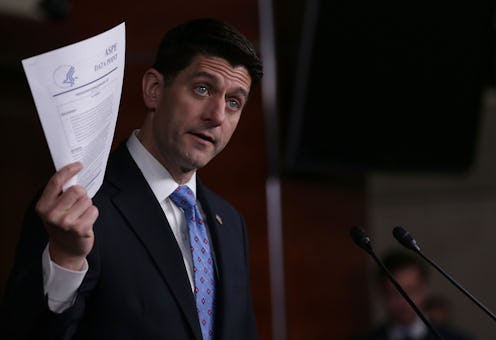
In May, the House of Representatives passed the American Health Care Act (AHCA). Following the bill's passage, Senate Republicans announced that they would be crafting their own version of a healthcare bill for consideration. However, since then, little information has been made public about the content of this bill, leaving many to wonder what exactly is happening with the AHCA.
Sadly, it looks like the public (and even, perhaps, many senators) will remain in the dark about the Senate bill's contents for awhile longer, as the Senate's 13-member (all Republican, all male) healthcare working group has indicated that it will not be releasing the text of the bill anytime soon.
According to the Los Angeles Times, the Senate healthcare working group is close to finalizing the text of the Senate version of the AHCA and hopes to send it to the Congressional Budget Office (CBO) to receive a score evaluating its financial impact by sometime next week. According to Vox, the text will very likely not be made public before the bill is sent to the CBO. It is also very possible that senators who are not part of the healthcare working group will not be allowed to see the text of the legislation before it is submitted for scoring.
It seems that both Republican and Democratic senators have expressed their frustration at being kept in the dark about the impending healthcare legislation. "I want to know exactly what's in the Senate bill. I don't know yet. ... It's not a good process," Republican Sen. Ron Johnson of Wisconsin reportedly told Bloomberg's Sahil Kapur.
Missouri Democratic Sen. Claire McCaskill also showed disdain for the secrecy around the legislation at a recent hearing, saying "We have no idea what's being proposed. ... There's a group of guys in a back room somewhere that are making these decisions."
In addition to withholding the contents of the bill from the public, Senate Republicans have also invoked Senate Rule 14, which means that, once the legislation is finalized and has a CBO score, it will head straight to the full Senate floor for a vote. The legislation will not go through the committee process and will not be subject to hearings or debate. By comparison, as The New York Times reported, when working to pass Obamacare in 2009, the Senate health committee spent 13 days marking up the bill and the full Senate debated the bill for 25 days.
Many are speculating that Republicans are seemingly rushing to get the bill to the Senate floor so a final vote on the legislation can be held before September 30. This date constitutes the deadline by which the Senate must vote on the healthcare legislation in order for it to be passed using the budget reconciliation process. That would allow for passage with a simple majority because it does not allow for a democratic filibuster.
While the Senate healthcare bill process has certainly been characterized by secrecy, there is a small amount of insight into what the bill may contain. According to the Los Angeles Times, the bill will likely include stronger protections for people with pre-existing conditions that would prohibit insurance companies from charging them more for insurance. It could also limit efforts to completely stop Obamacare-driven Medicaid expansion (something which the House AHCA mandates).
However, these are still only assumptions about what the Senate version of the bill contains. Ultimately, not one member of the public has seen the content of the bill — which is highly problematic, as the bill stands to profoundly affect the lives of millions of Americans. Hopefully increased public attention to the secrecy with which the legislation is being developed will put pressure on Senate Republicans to release the text of the bill as soon as it is ready — and not wait to do so until the bill is up for a vote on the Senate floor.